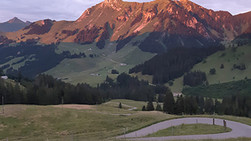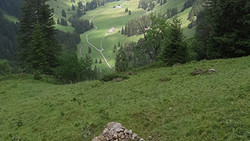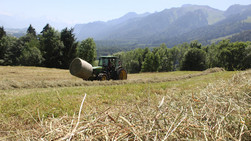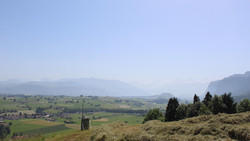top of page

adopt-an-alp: steiners hohberg
this is our alp.
this is your alp.
from october 2019, the cheesemakers on alp steiners hohberg are sending their cheese
to boston cheese cellar, exclusively in new england
they are known for their sensational, and award winning vacherin fribourgeois, alpkäse and raclette
Videos
Watch some videos here of Alp Steiners Hohberg!


Save the Date to Celebrate!
Join us on Saturday Nov 2nd, to celebrate our Adopted Alp.
There will be cheese with new batches of Alpkäse 2019 and the sublime Vacherin Fribourgeois to try and purchase. There will be T shirts to be won in a trivia competition, and there will be a performance by Swiss-born singer and storyteller, Gabriela Martina (https://gabrielamartina.com), from 12 - 1 pm.
See you there!

Save the Date
It's arriving!
Oct 2nd. Cheese has arrived!
Ruoti and Kevin has sent us our first cheese for the year: Alpkase 2018, which has matured since last year, salty, herbaceous. Raclette, punchy, sticky, yummy and ready to melt.
The opposite is the new label that they are placing on their cheeses: it's a scene from the valley, which you'll probably recognize if you study the photos of our Alp trip to visit them, in our blog!

Alpine Club!
Join the Alpine Club!
Guarantee your cheese from Steiners Hohberg, support traditional cheesemaking, and transhumance, by joining our Alpine Club!
You will receive 2 x 0.5 lb of Steiners cheese, delivered to your door, by carbon neutral UPS or bicycle courier:
• October receive, 0.5 lb Raclette, and 0.5 lb Alpkäse 2018
• November receive, 0.5 lb Vacherin Fribourgeois, 0.5 lb Alpkäse 2019
• December receive, 0.5 lb Raclette, and 0.5 lb Alpkäse 2019
Not only that, but you will also get a free T shirt which celebrates the character of Steiners Hohberg, drawn and designed by our resident artist and cheesemonger, Amanda Willey.
What are you waiting for!


SOLD OUT
Sept 2nd 2019. Drastic weather changes.
It seems like the Alps are very sensitive to overall climate change. From unusually hot, and dry summers, to erratic tropical storms. Christian Stucki, one of the farmers who brings his milk to Fabian, Ruoti and Kevin, took some photos of the beautiful Alp, but also some video of the crazy storms which have started to blow through in the past few years.
Although they are not damaging, and the cows find shelter, one has to wonder if these are portents of deeper trends.





Drastic Weather
Transhumance
Transhumance: What, How, Why?
Transhumance is the movement of livestock (goats, cows, sheep) and people to areas of higher altitude. It is a traditional dairying practice performed in many countries in Europe. The plants and flowers at these higher altitudes revel in stronger sunshine, and are less disturbed by human interference, so that in these areas the biologically diversity is the most broad (think conservation area).
Every Spring, families drive their herd (or a village's herds) up to a mountain chalet and dairy where they live, milk and make cheese for the Summer. Sometimes, in mid-summer, once the snow has cleared they are even able to head up to an even higher meadow, to get that bit closer to the sun.
Why does this matter? Milk produced by the livestock is directly effected by the surrounding environment. The milk, and therefore the cheese, is a reservoir for anything that they eat. Milk is composed of water, fats, lactose, proteins, minerals and other 'organic compounds'. These organics can be both natural (such b-carotene and terpenes from grasses & flowers), or human-derived such as toxins and fertiliser byproducts. The more of the former category, and the less of them latter category, the better for the cheese and our health. The natural organic compounds will help to create flavours and aromas which are unique to the Alp. With little human interference in this isolated environment, there should be less toxins and other nasty compounds.
The purity and diversity (both floral and microbial), of the environment creates cheese (and other dairy products) with rich, delicious, complex flavours, which are beneficial to our health. A diverse microbial profile from these cheeses, transfers itself to our guts, and has been shown to be medically beneficial for humans reducing allergies and asthma, as well as even improving responses to certain anti-cancer therapies [read more in our blog!]


Summer Heat
July 17th 2019. Summer Heat
It has been a hot summer on Alp Steiners Hohberg. This, combining with the wet Spring, means there's a lot of lush grass. The makes the cows happy, and means there's a lot of milk available for making cheese!
In fact Ruoti, Fabian and Kevin, are at their maximum output, and can't use all the milk that their 8 dairies are bringing to them. The farmers are therefore taking the milk down to the local town of Pfaffeien for it to be made into more cheese by other cheesemakers.
It's nice to have excess over famine for sure!
The heat also means that it's a good time to make hay (cut and sun-dried grass) for the winter. As the saying goes:
"Make hay while the sun shines"!






Introducing the Alp
July 12th 2019. Introducing the Alp
Alp Steiners Hohberg is north east of Friborg, and south east of Bern in Swtizerland. On the slopes of the Alp are 8 dairies, and every morning @ 5.30 am, they bring their milk to the cheesemaker in the valley surrounded by the Alp: Alpkaserei Ganterstli. There Kevin, Fabian and their father Ruoti make the and age their cheese, Alpkäse, Raclette and Vacherin Fribourgeois.
The dairies practice transhumance: the seasonal migration from the low altitude winter pastures, to the higher alpine meadows.
At these higher altitudes, the sun is stronger, the air & water is cleaner, allowing the pastures to be rich in floral and microbial biodiversity. This biodiversity adds to the complexity of the cheese's flavors as it ages. The greater the biodiversity the more complex the cheese might become. This microbial biodiversity has also be shown to have major positive impacts on our health.






July 12th 2019. Introducing Fabian, Kevin & Ruoti
The eight dairies on Alp Steiners Hohberg bring their milk to Alpkäserei Ganterstli, where it is transformed into cheese. For the previous 15 years, the cheesemaker was Kari Mueller, but in 2019 a younger generation is taking the reigns. Fabian (pictured), Kevin (not pictured) and Ruoti (their father, pictured) have taken over the cheesemaking facility. Fabian was trained in the valley, making Gruyère.
They make 4 cheeses, Raclette, Alpkäse, Vacherin Fribourgeois, and a fresh cheese called Ziger. We will be receiving these cheeses in October/November.
Each has a different recipe, and aging requirements, such as a brine bath (pictured). There is some space for aging on the Alp, but the wheels of cheese are also taken down to the valley and the town of Plaffeinen, where they have another ageing cellar.






bottom of page